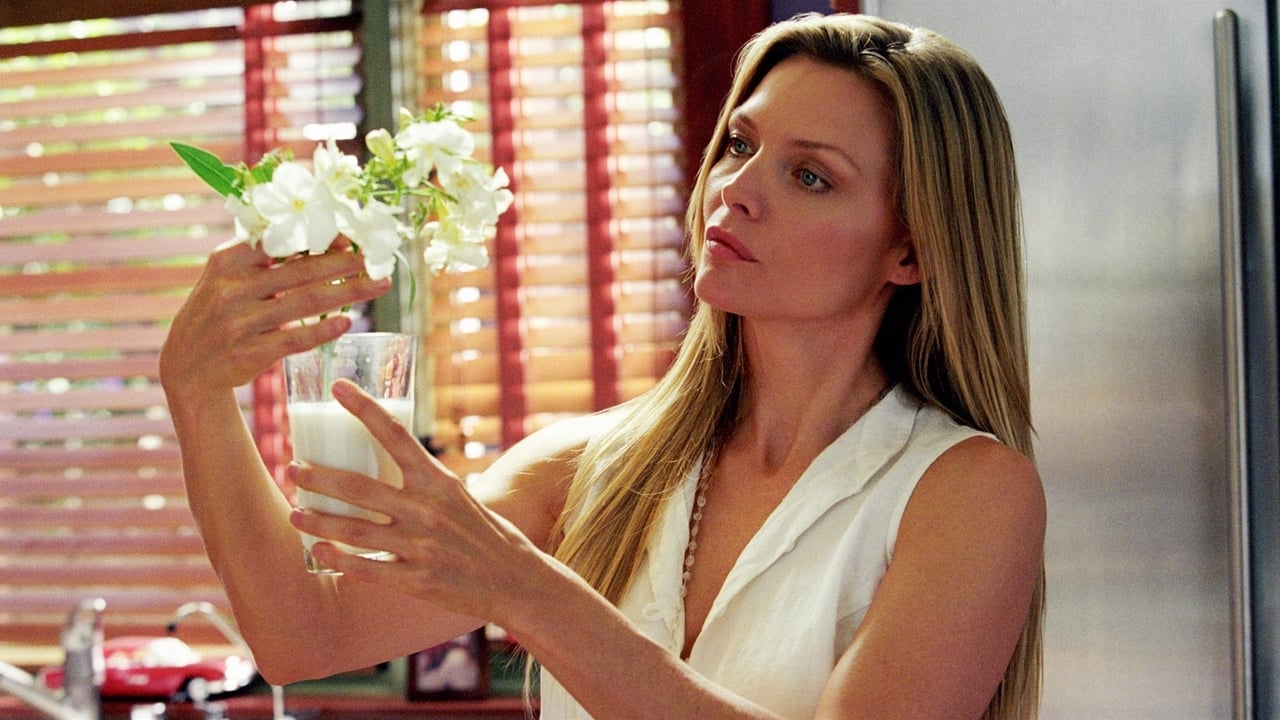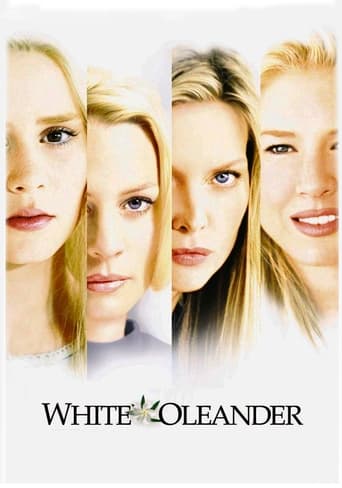Manthast
Absolutely amazing
Sarita Rafferty
There are moments that feel comical, some horrific, and some downright inspiring but the tonal shifts hardly matter as the end results come to a film that's perfect for this time.
Cassandra
Story: It's very simple but honestly that is fine.
Walter Sloane
Mostly, the movie is committed to the value of a good time.
Kirpianuscus
one of films who continue in the memory of the viewer long time after its end. like the novel who inspired it. because it seems be perfect. the performances, the atmosphere, each detail, dialogues and the impression to see the making of large spider web. a film who gives only questions. powerful for the force to impose each of theme. not comfortable because the themes are very delicate and the desire of director is to explore each in precise, profound manner. the great thing is the way in which the story becomes yours. the extraordinary job of Renee Zellweger. the metamorphose of Astrid who has in Allison Lohmann a great interpreter. a dark, uncomfortable, cruel and high honest film. maybe useful. like a huge mirror.
mcsheehey
Since the birth of Hollywood, countless films have aspired to dispel the myths surrounding the city of lights, cameras, and action. Films like 1950's "Sunset Boulevard" and 1991's "Bugsy" have juxtaposed palm trees, sunshine, and mansions with murder, jealousy, and madness. These films look pretty and bright, but they showcase the darkest shades of human nature. With his adaptation of Janet Fitch's novel "White Oleander," Peter Kosminsky tries to join the ranks of such Hollywood demystifiers as Billy Wilder and Robert Altman. On that front, he succeeds only marginally. However, on other fronts, he accomplishes quite a bit.When her mother goes to prison for a violent act of vengeance, young Astrid, the protagonist of "White Oleander," floats from foster family to foster family. Due in part to the efforts of her conniving mother Ingrid, Astrid cannot seem to settle down in any one place; conflict always strikes. As time goes by, innocent Astrid must confront the cruelest of circumstances, again and again. Her foster mothers have strikingly different characteristics, but no one of them is what she seems. From her beautiful but selfish mother (Michelle Pfeiffer) to the allegedly "saved" but jealous Starr (Robin Wright) to the kindly but ill-equipped Claire (Renee Zellweger), Alison Lohman's Astrid seems to have nowhere safe to turn.The film's poster says almost all that needs to be said about the plot and theme of "White Oleander." The poster displays the faces of the four leads; all four are blonde, all four look beautiful, and each face seems to meld into the next. While beauty resides, an eeriness pervades the image; everything looks a little too perfect. As it happens, it is. Each face hides some tragic truth that will guide the flow of Astrid's young life. Like the shining city in which the film takes place, the leading ladies of "White Oleander" are externally pretty but internally dark and unstable. This is ail very well, but we've seen it before, done better, in other films. The larger arc of Astrid's character comes across brilliantly, but the structure moves in episodic fashion, which prevents the film from having a true climax. Moreover, the movie's supposed payoff, an imminent confrontation between Astrid and Ingrid, comes across as simply a rehash of what the audience already knows. The film seems too desperate at times to make its point; it even resorts to wistful narration that, while softly spoken, still manages to hit the viewer over the head. Even some of the shots in the film try so hard to show eerie beauty that they come across as hackneyed and heavy-handed. Still, "White Oleander" offers up a lot of greatness in other areas.All four "leading" performances work brilliantly. Alison Lohman has a great understanding of her character, and thus manages to play every one of her emotional and physical states with conviction. While not given much screen time to flex her always exciting acting muscles, Robin Wright fleshes out her Bible-thumping mother with just enough humanity to make her believable; the character stands as a bit of a stereotype, but Wright at least gives it emotional resonance. Even better is Zellweger as Claire. She communicates sweetness and quiet instability with shocking humor and grace; just as Astrid loves and admires her, we do. All things considered, though, Michelle Pfeiffer gives the performance of the film. As Ingrid, she is ferocious. An actress who rarely resorts to theatricality for her roles, Pfeiffer plays every scene so true to character; she is truly scary. In the end, "White Oleander" moves fairly quickly, although not very subtly, towards a disappointing finale. It will not be remembered for its not-so-groundbreaking plot, but it should be remembered for its brilliant performances. Where the film sometimes fails to show the whitewashed grime of its city, the actresses compellingly render the whitewashed grime of humanity.
Jackson Booth-Millard
I might have heard the title somewhere, I think what appealed to me more was a good cast list and a good sounding plot. Basically fifteen year old Astrid Magnussen (Big Fish's Alison Lohman) has her life changed when her free-spirited poet and artist mother Ingrid (Michelle Pfeiffer) sent to prison for murdering Barry Kolker (Billy Connolly) with the deadly poison of her favourite flower, the White Oleander. Astrid has to go through foster home after foster home with three different women, all with their good sides, but ultimately all ending badly. First with trailer-park Christian Starr (Forrest Gumps' Robin Wright Penn) who turns out to be an alcoholic and loses it with Astrid. Second with struggling actress Claire Richards (Renée Zellweger) who seemed the perfect, ideal guardian, but after being told by her husband Ray (Pitch Black's Cole Hauser) she overdoses on some pills. Third and last is wily hustler Rena Gruschenka (Svetlana Efremova), not a very long stay, and not as interesting as the other two. While Astrid goes through all these experiences, she keeps in contact with her mother with letters and a couple of prison visits. Going through forbidden love, religion, a near-death experience, drugs and starvation, Astrid learns to think for herself, and in the end, her mother decides not to ask her to give her statement in her court case, and lets her go to live her own life. Also starring Patrick Fugit as Paul Trout and Noah Wyle as Mark Richards. Lohman is a fantastic young leading actress, Pfeiffer as her over-opinionated mother does well, and Zellweger is most appealing as the second guardian, you feel sympathetic for her, especially when she's dead, a very watchable drama. Good!
magy_1994
It's not the best movie I've ever seen. Actually it isn't a great movie at all. But...it's good to watch it. Most of the things in this film are so...banal and...repeated soo many times by our parents and especially by our mothers. But I'm not going to agree with some of the advices... For example:1. "Never apologize. Never explain." People apologize when they see they've made a mistake. You can't change the past, but you can change the future. Apologieze and the mistake could be...forgiven...forgotten...it depends of how hard it is. But I believe everything is possible. Apologieze...with a need. It's stupid to say "Do not apologize." It's something like "You are God and everybody deserve to serve you. You must NOT admit your guilt because...we don't know why but it's forbidden! You are sinless." No! It's humanity making mistakes. Of course, I'm not saying we should always say "Yes, it's my fault, sorry, I really didn't mean to do that. It's wrong. Oh, of course it is." Bla bla bla. We just have to be honest...sometimes. Explain? Yes. We shouldn't explain only to people who doesn't care about us. But...explaining is part of saying "Sorry". Giving a reason why did I do that and why I think it's wrong or not. But in the movie they say we shouldn't explain anything. Again because we are great, perfect, sinless... Well...this is arrogant for sure.2. "You are perfect." Wohoa! I am not agree with that, too. It is awful to think you are perfect. Well...it isn't good to think you are the worst creature in the whole white world, but you should be a little critical to yourself at least. To think you are perfect is to think you are sinless. Nobody is.3. "Love humiliates you. Hatred cradles you." Lol! Love is...something beautiful when you find the person and share it. It can give you a power to live...to do some things. It makes you believe in yourself. It never humiliates you. If the man do it- this is not a love. Most of the people says "Love is all you need." and I was ready to believe them but...they are wrong. We need...happiness, whatever makes us happy. It can be everything. Depends of what kind of a person you are. Hatred...is something bed and I am really not agree with Astred's mother. There's a difference between "I hate you." and "I do not like you." The hatred...can make me feel sad but it can't cradle me. This is something very...powerful and they aren't many people who can feel it.4. Addiction is something bed. Of course it is. But you can't be lonely for all of your life because of the protective wall you have builded. When you are hungry- you eat, when you are dusty- you drink something and when you feel loneliness- you are looking for a person who can fill this space. Because there IS a person who can do it and you just have to find it.There are lots of things i don't like in this movie. Well...yes, mother's love is poisonous...like the white oleander. But flowers gives us an oxygen to breathe, right? And that's why we are still alive. I will always need my mother. She is only trying to protect me. All the mothers are. They are worried about us. Maybe they know how hard will be the collision with the real life and they are trying to precondition us. One part of movie's idea is to make you think you are...perfect and you shouldn't show your defects. But sometimes it's... needful. Remember.And finally, I don't like this movie because it's giving us many wrong advices. Rules, we should break instead of observe. We shouldn't think our mothers are our enemies. As I said, flowers gives us an oxygen. Something we can't live without.

